Conversation "The stupid things we did in Xinbaodao, and the awkward novels: Huang Chongkai x He Jingbin
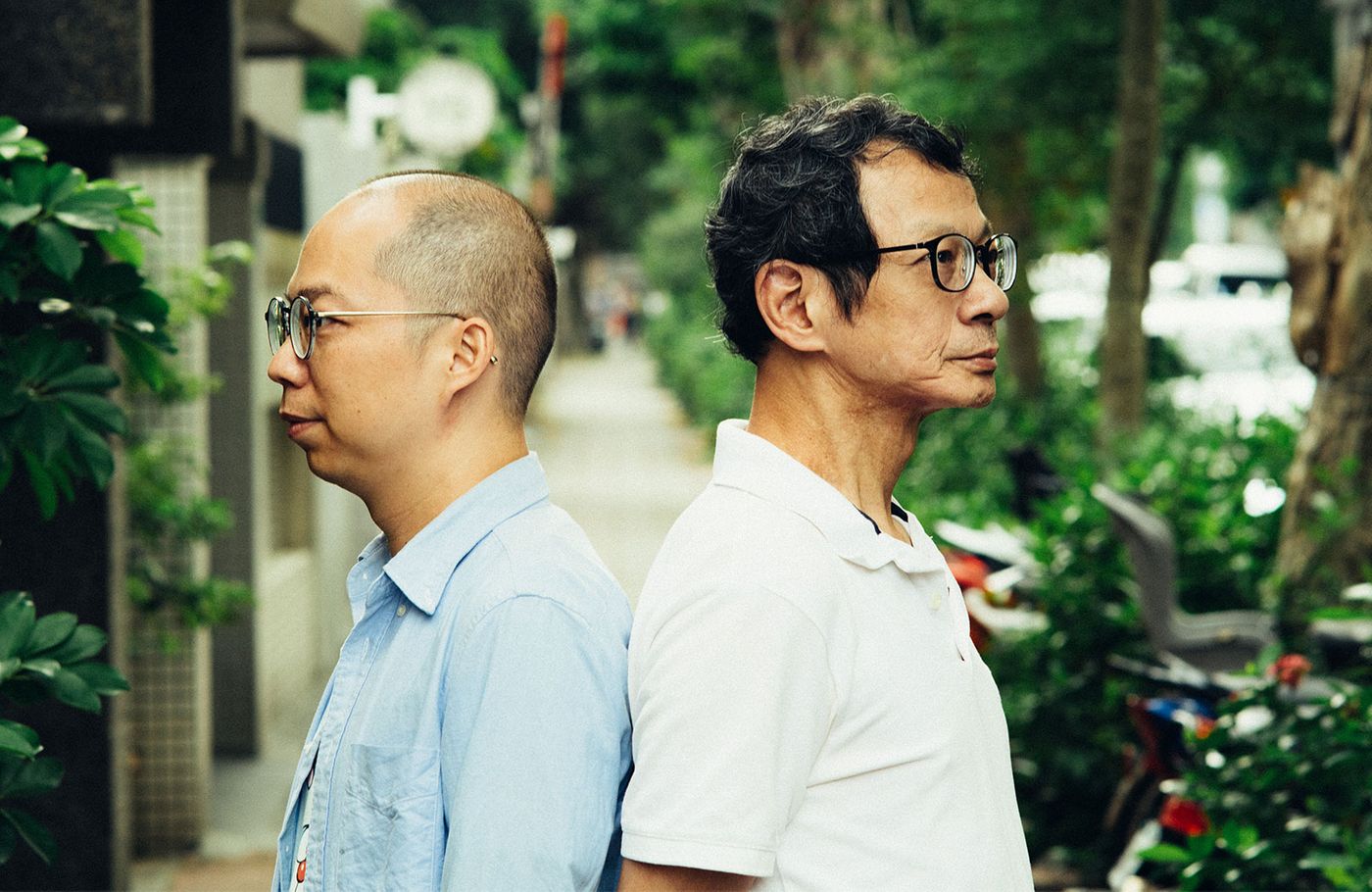
Text Arrangement|Dong Boting Photography| Chen Yitang
Zhuang Ruilin (hereinafter referred to as Zhuang) : Please talk about the reading experience when you first received each other's new manuscripts. How do you understand each other's works?
Huang Chongkai (hereinafter referred to as Huang) : "The Stupid Things We Did" (hereinafter referred to as "The Stupid Things") is not the same as "Last Year at Alu Bar" (hereinafter referred to as "Aru Bar"). When I first read "Alu Bar", I often felt that the author was younger than me, and the narrative was full of joy, with a funny and carnival element. The narrative voice of "Stupid Things" became a little deeper, and it brought me into a sense of time and space that was not quite the same as "Aru Bar".
As I read the first two chapters, I wondered how the work would extend and how it would take on the overall structure. After reading the book, I felt that the structure of the work is not a structure similar to a building, but like an oil painting, with layers of background colors superimposed and laid out. "Stupid Things" is more eloquent, boldly showing various aspects of abstract thinking.
He Jingbin (hereafter referred to as He) : Did it cause you any trouble in reading?
Huang : No worries. Instead, I have been looking forward to seeing how you integrate knowledge into your "Painting Tigers𡳞", how to convert abstract thinking into language, and reduce the dimension of language so that readers can understand it after reading it. What the novel is about to say (questioning about the nature of "I") is actually very metaphysical, abstract, and metaphysical. It's difficult. At the same time, not only one narrator is speaking in the novel, but even the three apps take turns to activate the ability to make up stories, connecting the entire narrative context through multi-channels from different angles, becoming a net-like narrative type.
By the way, the women in the novel are all so wonderful and beautiful. In fact, you are still very romantic.

He: I admit that I am writing about the ideal woman. As I said in the book, all romances have this common problem, they appear for a certain narrative purpose, and with such a purpose, corresponding issues arise. The pursuit of love, the pursuit of art, to put it bluntly, is the pursuit of a certain ideal.
When I first started reading "New Treasure Island", I thought you were going to talk about geopolitics, trying to interpret the historical relationship through geography, but later I discovered that it was not just a geographical play, but a deeper level, through the dislocation of Cuba and Taiwan in time and space, Let people know that they can think about the issue of Taiwan from another angle, and finally bring the issue of identity, and through the dialectics of aboriginal identity, let the reader think from a different perspective, and ask "Why do we think for others and how to think for others?" " thoughts.
The key to the beauty of "New Treasure Island" lies in "handling the current problems with literature". You are brave enough to speak out about our current anxieties. One of the advantages of novels is that they allow people to read other people's minds in a similar way. "New Treasure Island" proposes issues for readers to imagine different solutions, which is like a kind of philosophical thought experiment - the geographical environment of Taiwan and Cuba is related to the national conditions. To a certain extent, they are similar and face the hegemonic oppression of major powers, but Cuba can do something, why can't Taiwan do it? For example, why can Cuba export revolution, while Taiwan can only be beaten? Why can America elect a black president? Taiwan can't elect an aboriginal president?
Identifying patterns and establishing patterns is the most valuable ability of human beings to discover nature. You seem to recognize a pattern in geography and history, and you can deduce a lot of possibilities, making Cuba and Taiwan an interesting contrast. I'm curious, how did you come up with the idea of thinking about Taiwan and Cuba side by side? I think you should have been filled with the excitement of Archimedes, just like when humans found hunters and bears from the stars.
Huang : It is difficult to describe clearly how I came up with this idea, but I was so excited that I wanted to jump up. The idea for this book came long before I wrote "Yellow Fiction": What if I woke up one day and found myself in Cuba? Or to exaggerate a little, what if all Taiwanese exchanged with all Cubans? It seems interesting to think about it, and the more I think about it, the more connections I find. But I felt that I was not able to deal with such an idea at the time, so I kept it in my heart first, flipped through relevant materials from time to time, and pondered on this idea. It was not until one or two years ago that I decided to respond positively to it.
Probably because of the idea of comparing Taiwan and Cuba first, my eyes naturally began to look for the similarities and differences between the two countries, and I felt more and more like the existence of mirror images of the two places, like a variation of the same theme.
Many people may be like me, from Garcia. Marquis's "One Hundred Years of Solitude" entered the world of Latin American literature. As I read more Latin American literature, I also pondered the situation in Taiwan, especially since the two are quite similar in the imagination of many cultures and beliefs. When talking about liberation theology in Latin America, Taiwan is the same. All the gods have been localized in Taiwan, and they must respond to the good and evil in the world and care for the oppressed ordinary people. In addition, Taiwan has also been colonized for a long time, the two places are vaguely connected, and there are many connotations that can be compared and explored, so I finally wrote a novel like "New Treasure Island" to respond to the Latin American literary works I have read and reflections on these questions.

➤ Fragmented world, a noisy perspective
He : What amazes me most about "New Treasure Island" is that its narrative structure is freely interspersed with multiple perspectives. It can change perspectives at any time without being restricted by whoever calls it. Each chapter can be its own independent story, breaking the past. The novel adopts a unified narrative from a unit perspective. Maybe this will be our strategy for dealing with the fragmented world in the future. We no longer stick to the central narrative of the classics, but the state of public noise.
Huang : The biggest difference between "The Stupid Things We Did" and "Last Year in Aru" is that it is narrated from multiple perspectives, rather than a consistent state from beginning to end. There are many divergent parts in the middle. When understanding the concepts of this book, I found that they were interrelated with each other. The two novels have changed from a single narrative to a multi-voice tone. How does Brother He see such a change in narrative structure?
He : I think the world has changed, and so have we. Literature has to change to adapt to the new world. Adopting multiple perspectives, instead of looking at the world through the main perspective or the author's omniscient perspective, is just an attempt to more comprehensively reflect the new world and interpret new facts more accurately.
Faced with the fragmented world now, you can no longer use the overall narrative to hold the right to speak. If you want to explore the truth, you can't limit yourself to the previous method, you must find a new method, after all, it is a completely different world view.
Huang : But I sometimes doubt that these attempts we have made, the possibility of thinking about what else novels can do, is it a little far for ordinary readers?
He : No, I think as long as the work has some quality that can hit the readers somewhere, the readers will naturally catch up.
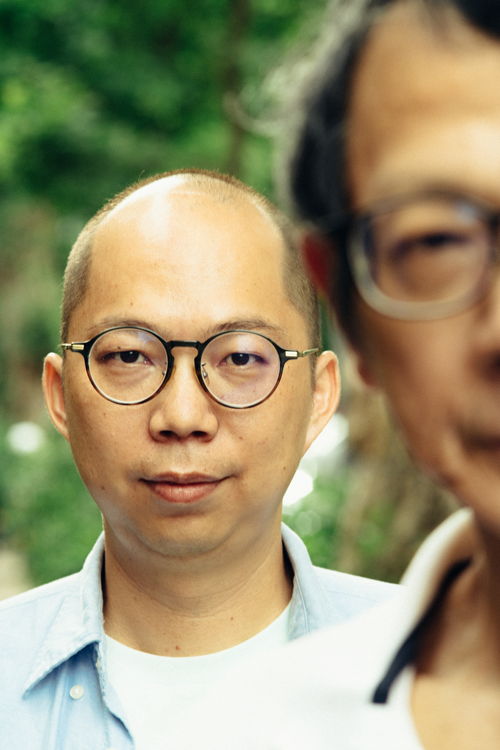
Huang : Brother He's novels seem to be dealing with a world of science fiction and fantasy, but there are many real objects in it (exact geographic location, descriptions of food and wine, etc.), which are like ballast stones. of readers generate direct links. When arranging these materials, how do you manage the gap between the story itself and reality?
In addition to this level, Brother He's novels have another level - exploring the relationship between the human mind and things. In our contemporary living situation, weak artificial intelligence is developing rapidly. For example, when returning home, the lights are automatically turned on, sweeping robots, or the application of big data analysis in commodity sales and forecasting, etc. All kinds of technologies seem to have a certain degree of humanity. Most of these are the communication between things, but in your novels, it seems that you can read the forward-looking communication between hearts and things.
He : I think about what is human nature, the subject, the self, the mind, the will, etc., all these terms that often appear without thinking in the humanities field will definitely be the ultimate problems faced by all materialistic sciences. Under the current material conditions, no one has a way to explain it. What can we know on this illusory basis? I don't know whether it is materialism or idealism, but this is the responsibility of the writer, and the writer is obliged to ask questions first. Writing a novel is trying to find out where the problem is and what angle to think about.
Science fiction is sometimes not so easy to define. If you show "Anna Karenina" to the people of the Renaissance, trains are quite "science fiction" to them. You see so many highly intelligent elites writing science fiction, but before the invention of the Internet and mobile phones, no one thought there would be such a thing. I mean, we simply can't imagine what it will be like 30 years from now. Before the fall of the Soviet Empire, no one imagined this day would come. "1984" is not intended to predict the future world, but to present the urgent problems facing the present.
Huang : I remembered that you mentioned in an article "Why is science fiction flourishing in North America, but magic is quietly growing and spreading in South America?". Around the 1950s was the golden age of American science fiction, with Isaac Asimov, Arthur. Clark (Arthur Charles Clarke) and many other science fiction writers, works. The 1960s was the era of the so-called "literary explosion" in Latin America, and a literary trend called "magic realism" emerged. However, whether it is science fiction or magical reality, to a certain extent, it can be regarded as a different path to respond, interpret, and criticize reality.
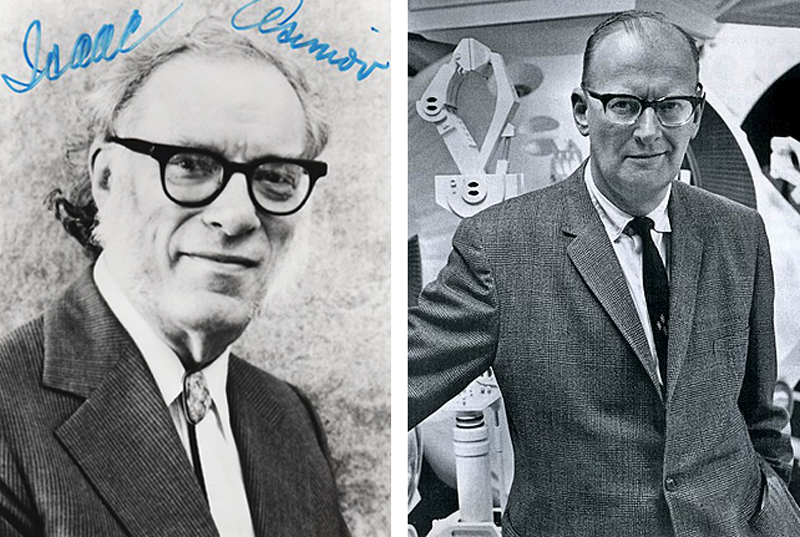
60 years later, on our own writing paths, we also try to take different paths in order to reflect on the current real problems. I am very aware that my reading and writing in the past ten years have been greatly influenced by Latin American literature. Perhaps "New Treasure Island" can be regarded as a distant echo of the literary explosion in the 1960s.
Interestingly, during the beta test of "New Treasure Island", many readers thought it was a science fiction novel, and even expected that the novel would explain the mechanism and reason of the big exchange, but they didn't explain it until the end, and they were probably a little disappointed.
He : I still remember discussing this question with you a few years ago: in the same era, why did Latin America develop magical realism, while the United States exploded into space opera epics? I think this is a very good mystery in the history of literature, and it is worth exploring from different angles.
If viewed from the perspective of post-colonial phenomena, science fiction can be seen as a continuation of American hegemonic colonization. The narrative skeleton of space opera is very similar to the Age of Voyages, seeking to extend hegemony to alien planets. What would be the problem; similarly, Latin The magic of America is also a product of postcolonialism, but they can only seek answers from history to answer how it became like this, and what should we do now? Fundamentally, both are designed to deal with the realities of the moment. There are two angles to solve the problem. The winners tend to throw history into the trash first, and those with power will look forward first, so they get a fantasy space opera. And the victim's instinct is usually to look back first, trying to figure out what was wrong; seeing hopelessness is the moment when the magic of hope is born.
I believe that when encountering "New Treasure Island", someone will ask: Why can Taiwan and Cuba be dislocated all of a sudden? But I don't think you need to answer at all. You just need to put forward the initial setting, use your imagination, and present the problem, and that's enough. Next comes the question of the reader's interpretive ability. Would anyone go and ask "Journey to the West" or "Gulliver's Travels" how is that possible? In fact, readers and authors of novels have always had a meta-subliminal agreement, that is, you give me a world and let me see what I can get. Without this unspoken rule, the novel could not have happened.
The fundamentalist school of realism is often armed with a katana that points to the impossibility of certain works. They want a world where cause and effect and facts are clearly established. The truth is, what can be imagined is far more powerful than what can happen. Without those fictitious, faith-based forces such as banknotes, such as credit cards, there would be no society as complex as we are now.
I don't recommend treating "New Treasure Island" as a science fiction novel. Even if it is regarded as an alternative history, it is too underestimated the author's strength. In fact, the whole book of "New Treasure Island" is based on a very solid historical event, and each chapter is written based on many historical events, such as the Guantanamo Bay incident in the book, the Che. Guevara's pseudonym, or Gao Yisheng's family, etc., are the author's magical echoes of reality. Just accept its initial settings, and the pleasure of reading will grow from there.
➤ Colonial and Colonized Issues
Zhuang : Both works deal with different but equally important subject issues.
Recently, I am reading the book "The Age of Surveillance Capitalism", talking about how human beings have come from industrial capitalism to the third modernity. Human beings are calculated and regulated by the network and live in the setting... I think "The Stupid Things We Have Done" "The novel fully interprets the world in which the age of surveillance capitalism has arrived, and the novelist has thought it more clearly. The main issue of Chong Kai's thinking is more like responding to the question of the remnants of the world's identity after World War II, using a very good escape technique - to liberate Taiwan in order to truly understand Taiwan.
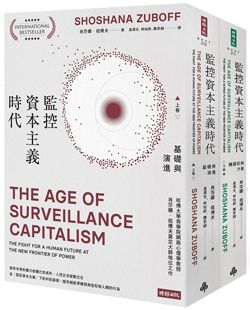
The two novels each discuss the subject matter of each other's concerns, but under this question, there is a very powerful "second narrative", which is a proposition with a longer history and more difficult to deal with - Brother He deals with the end of the novel. What is it and what does it have to do with modern humans? Chong Kai went back to the issue of aboriginal people, and even mentioned Li Wei Shi Tuo in the last chapter, which is also about the colonization and colonization of the invasion of the uncivilized land. Can you talk about your arrangement?
He : I think the focus of Chong Kai's treatment is from Abraham Harold Maslow's theory of needs, and even more broadly, he focuses on Taiwan's need to find its own identity, and even face the dignity of the world.
And my novels focus more on what comes after self-practice. We all deal with needs, but the anxiety we face is different. I have to deal with my anxiety before I can face the next anxiety. I have to deal with my "self" before I can talk about dignity. He starts from "self-identity", and he can seek the next one after his needs are met.
Simply put, the difference between the two books lies in the two focal points of "individual subjectivity" and "group subjectivity".
Huang : The basis of my novel is probably: the most impossible thing, what if there is a trace of it? In this fantasy so far away from reality, try to assemble all the almost impossible things together. But it is also in the process of writing that the problem consciousness of the novel is gradually clarified.
For example, the aboriginal president in the book was not set up from the beginning. But when my hypothetical scenario occurs, who becomes president becomes important. Then you have to imagine what kind of person and background the president might be.
When I do this, writing about a president with Indigenous status has to deal with Indigenous issues. How do I "think Indigenous people", "how Indigenous people think", and "Indigenous people as a way of thinking"? How can we examine the relationship between the aborigines and the Han people through their existence? This has become a metaphor. The relationship between oppressors and oppressors, as well as the relationship between the minority and the majority, has such a corresponding context in the layers of the structure.
I consider myself to be the least reflective native straight man, and the ethnic group that has the greatest advantage in the social system is often the most domineering. So I am often confused, what is the so-called self? And, what can an identity character like me do?
He : Hahaha, now the local straight men are the ones who have the original sin. I think the biggest highlight of "New Treasure Island" is that it dares to face the problems of the aboriginal people, and let us think about the pain of the aboriginal people from a different perspective. The role of the Han Chinese as oppression has never been explicitly discussed in literature. In high school, our history teacher reminded us that the most important question in Taiwan's general history is, why is your blue thread the same as mine?
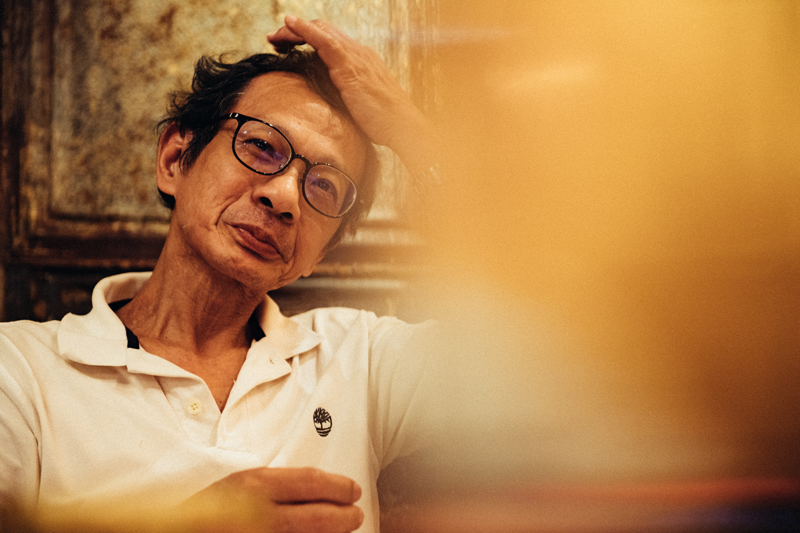
Zhuang : As a contemporary novelist, Chong Kai rewrites Tang Yingshen in the book, juxtaposing him with Wang Zhiming, the translator of Melancholy Tropics, and others who are concerned with the aboriginal movement, giving Tang Yingshen a different life, transcending our past understanding, so that our thinking about aboriginal people can continue to extend to the next step.
He : I think the most important issue is the subjectivity of the group. What is the anxiety of Taiwanese or Taiwanese's self-identity? It takes recognition to take the next step. In the past ten years, there have been many rediscoveries and writings of Taiwan's history. It is conceivable that the road of subjectivity has just started. "New Treasure Island" is the pioneer literature that appeared in this time and space.
In the era when I was growing up, we demanded only democracy, and we had democracy in our hands first. Even if there are occasional calls for residents' self-determination, self-identity and Taiwan's subjectivity are still very vague concepts. Now Taiwan pays attention to the issues of dignity and survival, because it is only after getting these things that it can stand firmer. I started with the subjectivity of the individual, and then I was able to talk about the subjectivity of the group, but in the end I had to go. In this respect, Chongkai is going faster than me.
Huang : Going fast may not necessarily go well (laughs).
In "The Stupid Things We Did", Brother He uses different forms and angles to make the story hyperlinked in a way that constantly diverges. The novel tells a fictional story, and the app in the book tells a fictional story. Fiction on top of that, forming layers upon layers of fiction.
In the chapter "New World" in "New Treasure Island", I also created another novel in my fictional work. But some readers seem to be bothered by this, and even come to ask why I do it.
He : We do this just because we live in layers of fiction. Simply put, each of us is a fiction, either by ourselves or by others. What we think of ourselves or our minds may not be able to withstand questioning. Virtual things like Facebook and the Internet shape us every day and make us what they want to be. We are shaped by the stratosphere and Google algorithms every day, and modern people cannot live without fiction. But nation, currency, country... are all things we imagined. Without these fictions, we would not be able to stick together as a group.
➤Good works must be provocative
Zhuang : Chongkai received a lot of feedback from readers during the beta test. Were those reactions what you expected? Some readers, because they are unfamiliar with Cuba, almost Google while reading, and follow the knowledge.
Huang : I didn't expect readers to encounter such obstacles. Because there are so many translated works in the Taiwan Book Market, you should be able to read them even if you don’t have pre-set knowledge of the historical and cultural backgrounds of other countries.
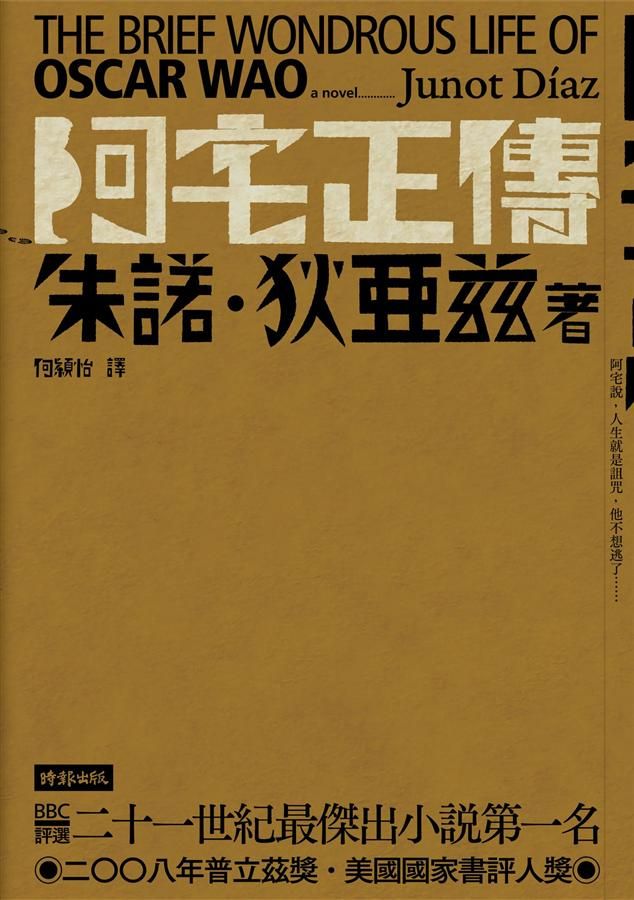
Perhaps some pure literary translation works require a certain amount of knowledge and cultural accumulation to understand the meanings they refer to. For example, Juno. Junot Díaz's " The Brief Wondrous Life of Oscar Wao " contains many stories of American otaku and Latinos living in the United States, but Taiwanese readers can still accept it.
He : If someone points out that your novel is difficult, I will think it is the greatest compliment to the author. That year, the Russian composer Stravinsky released the premiere of "The Rite of Spring" in Paris, and it also caused riots. Who would want to live in a fairy tale world forever? A good book should be like this, so that the reader will have a whole new feeling and vision after reading it. Isn't the value of art in making some kind of change in your whole mind?
Huang : Can we still cause such a big shake in this era? Is it still possible for us to provoke people and society in this era? Or maybe we seem to be making progress, but in fact, many people are locked in a closed circle, lacking others to break or challenge? I don't seem so optimistic.
He : I think the focus is not on deliberate provocation, but when you find something wrong, try to break through, and produce what you want. Think back to the good work in your mind. Usually, there are differences in form or content that make it a good work. The human mind will not be satisfied with the status quo, there will always be new realities and circumstances that produce new things. Even human nature is something that has evolved, and there will be different challenges in different times. There is no need to despair so quickly.
Huang : I agree with Brother He's statement. When a good work is created, it will transcend the limitations of time and space, be interpreted and transformed by good readers or creators, and become another kind of nourishment, or the exclusive interpretation method of that era.
He : It seems that all writers are inevitably classified into a certain genre, but creators hate people to put a hat on you.
Huang : You are often classified as a science fiction writer. How do you feel about that? You didn't intend to write science fiction from the beginning, did you?
He : I don't feel it when I say that. Creators should never be interpreters of their own work, otherwise they should be critics. I leave the right of interpretation to the observer. I'm not starting from the genre, but the common dilemma for writers these days is, with so many genres in front of you, what do you do, how do you choose?
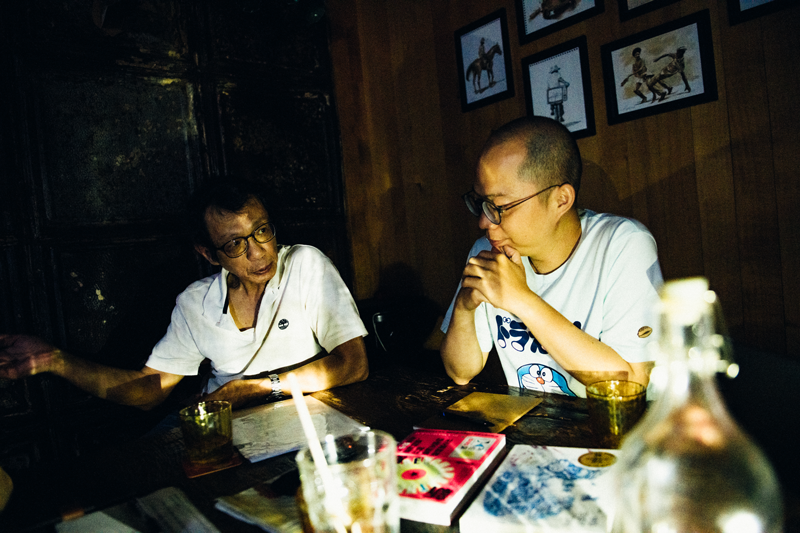
Huang : In today's publishing or reading market, genre is like a label that can be quickly understood and identified. But for people like us who write pure literary creations, it seems that there is no way to be properly placed in a certain kind of literature label or folder.
He : What is genre fiction? It's as intractable as discussing the line between prose and fiction. It's not worth it to get caught up in this question, it's just a waste of mind.
I feel that Taiwanese genre novels are not rich enough. If it is like the United States and Japan, then Taiwanese literature should be more flourishing. The popularization of novels originally appeared after the industrial age and capitalism. At first, it was also based on genres, targeting the literate middle class, and then slowly developed works that wanted to go beyond civic novels. There would be no Don Quixote without the genre of knightly romance.
Genre is a label, yes, a shortcut for readers to identify a work. Didn't I just say that recognition mode is the most basic mental mode, and now artificial intelligence relies on this to eat us. I think the literature we are talking about is actually living against being classified as a certain genre. Art can only exist in a way that is anti-art history, isn't it?
➤ Difficulties and successes faced by Taiwanese contemporary literature
Zhuang : Both are active Taiwanese literary writers. What kinds of possibilities do you see in the process of literary practice, as well as the dilemma of modern literary production?
Huang : When writing "New Treasure Island", the word "Taiwan" kept appearing, so much that I was a little tired of myself (laughs).
Taiwan is a political entity that is substantially independent but temporarily difficult to achieve de jure independence, and is still in the process of becoming. In this process, the ills of nationalism have actually emerged. The voice of nationalism will suppress the voice of the minority, and at the same time, it will suppress the thinking of more possibilities.
Of course we have to understand the Taiwan we live in. But when we only have to emphasize Taiwan's subjectivity, it seems that we will gradually confine ourselves to a frame, and we will not be able to truly communicate with the people or cultures around us. Therefore, the novel changes Taiwan to a distant continent, trying to put Taiwan back on the world map, and reconnect with the world through the coordinates where we are.
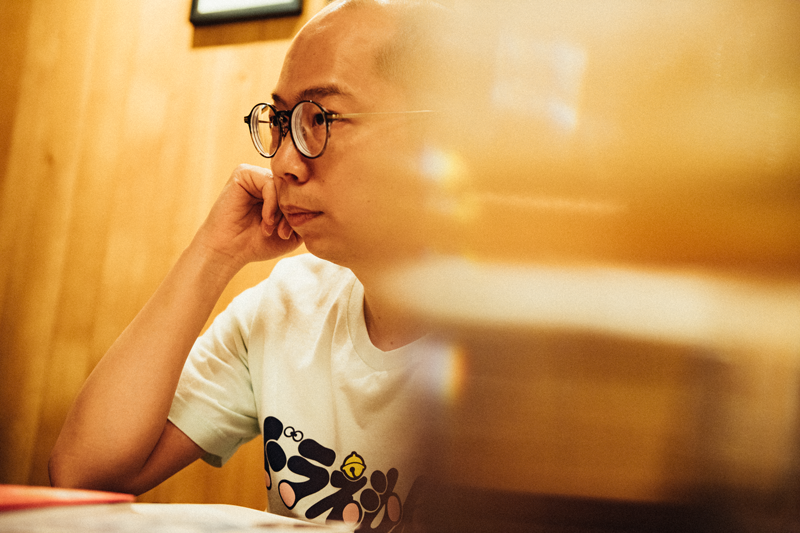
Congratulations : British fantasy writer Terry. Terry Pratchett said, "Light thinks it's faster than anything, but it's wrong. No matter how fast light is, darkness is always one step ahead of it, waiting for the light to come."
Where I am more pessimistic is the dilemma of literature. Our civilization is created by words, and it is only by language that we can think. But now I seem to be heading towards the path of thinking with images, which is actually a relatively primitive path, a world like the Spanish cave paintings. Even if there are pictures, there will be no truth, but if you follow Netflix, why should you read novels? This is not the same as my beliefs, and it is what I have been struggling and trying to pull back in "Stupid Things", those things that can't be expressed in images. But in fact, words are also dissolving themselves. What we face in the postmodern era is the ruins of words, not modern high-rise buildings, nor the ancient valley gardens. We're just in the rubble trying to make a decent stack of bricks.
But everything has two sides, there is violence and there is love, there is no absolute hope and there will be no absolute disappointment. There are always different narrative strategies in the face of different eras, we just have to try to find the narrative that corresponds to this era.
Zhuang : What do you think of the successful examples of Taiwanese literature in the past ten years? (You can define success yourself, maybe importance, or which work changed what?)
Huang : Tong Weige made me see a kind of node that grows in Taiwan and can connect with world literature. His "Fairy Tales" fictitious stories and dialogues of Nabokov, Kafka, Chekhov and others are extremely real to read. But he also laid out many local contexts in it, which converged into unique styles and texts, both world and local. Over the past few years, he and Hu Shuwen have edited together "Let the Past Be the Present: Selected Novels of Taiwan's White Horror" and "Soul and Ashes: Selected Essays of Taiwan's White Horror" , deeply thinking about this historical experience in Taiwan that cannot be avoided and must be faced. From him, I can see the interaction between world literature and Taiwan literature, as well as the depth and breadth presented.
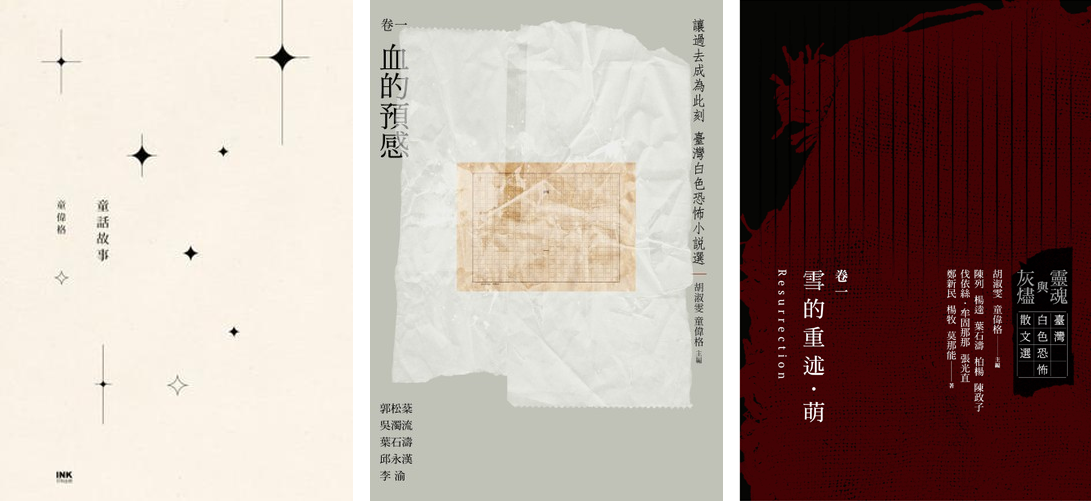
He : I just finished the first volume of "Selected Essays on White Terror". The "Red Fans Shot Down" in the book should be the most powerful and moving story I have read in recent years. I didn't expect that such a short oral statement could cover the four hundred years of Taiwan's history.
The most obvious thing in this decade is the emergence of "Taiwan's subjectivity." Many people are pursuing to reshape the story of Taiwan on this road to see what they will get in the end, and this and what is also changing. Chong Kai just said the key, you have seen the ills of nationalism emerging. If Taiwan's subjectivity must be based on the civilized syphilis of nationalism, it would be too unimaginative and hopeless.
Tolstoy's era talked about how to be a good person. My primary school motto was "come and learn to be a man", not the "dear and sincere" that was so empty and unclear in college. I think it is always necessary to learn to be a person first, and then there is the question of how to be a Taiwanese in the next step. ●( The original text was first published on the OPENBOOK official website on 2021-05-31)
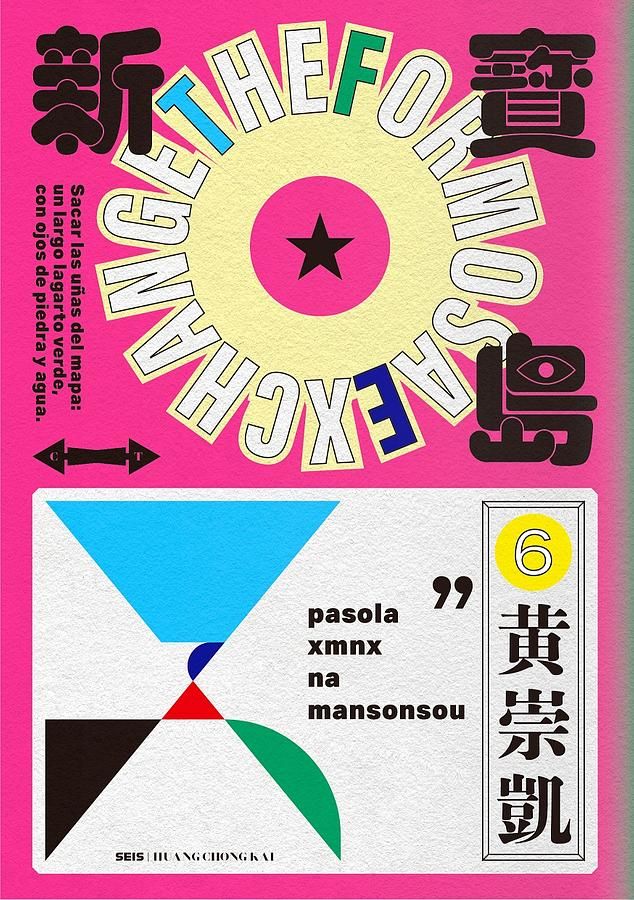
new treasure island
The Formosa Exchange
Author: Huang Chongkai Publishing: Chunshan Publishing
About the Author Huang Chongkai
Born in 1981, Yunlin native. Graduated from National Taiwan University. He used to be the director general of Gengxin Youth Writing Association. Edited for magazines and publications. Author of "Alphabet Club A~Z" (co-authored), "Literary Spring and Autumn", "Yellow Fiction", "Broken Man", "Farther than Pluto", "Boot Legs".
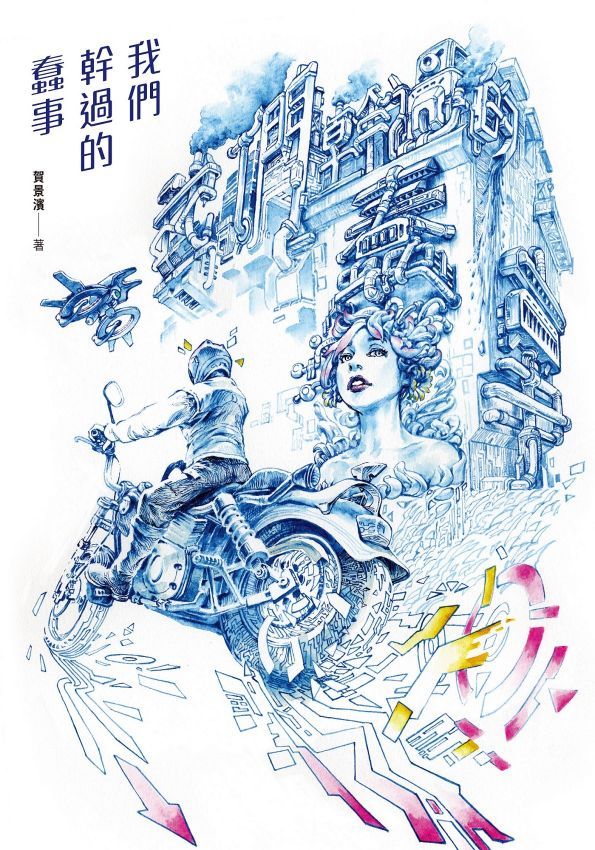
stupid things we did
Author: He Jingbin
Publishing: Spring Hill Publishing
About the Author He Jingbin <br class="smart">is the author of "Story of Speed" and "Last Year in Alu Bar". In 1990, he won the first prize of the Times Literary Award for Fiction with "Story of Speed". In 2005, he won the Lin Rongsan Literary Award for novels with "Last Year at Alu Bar".
Like my work? Don't forget to support and clap, let me know that you are with me on the road of creation. Keep this enthusiasm together!



- Author
- More